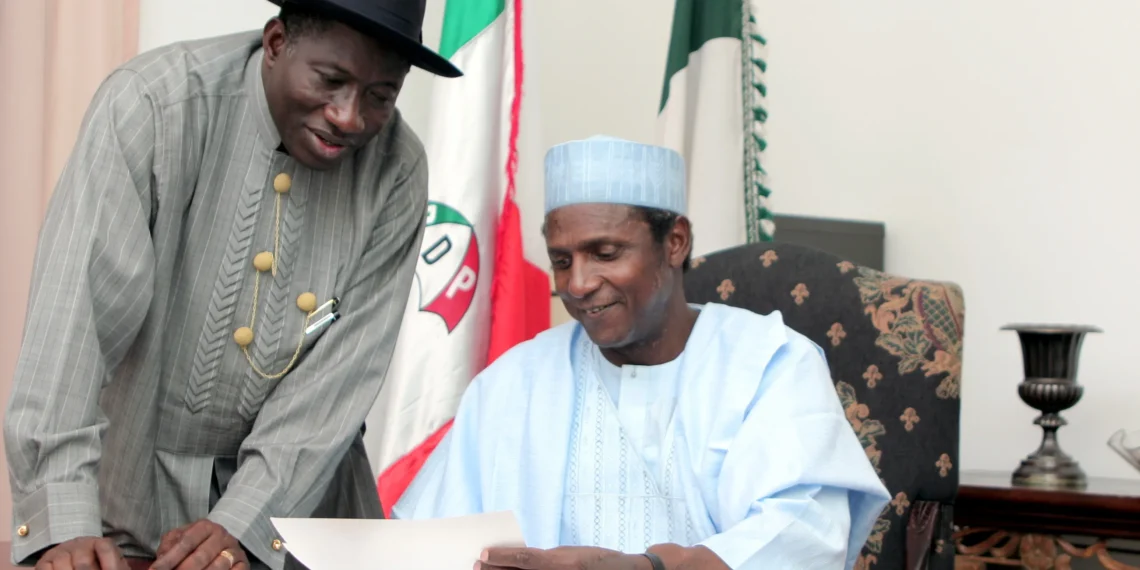Nigerians have commemorated the 15th anniversary of President Umaru Musa Yar’Adua’s death.
Yar’Adua, Nigeria’s third president, died on May 5, 2010, in Abuja, following a long fight with health difficulties, including an advanced bout with kidney failure.
His death marked the end of a presidency that, though brief, left a profound impact on the nation.
@bukolasaraki reflected, “Fifteen years later, Nigeria still feels the profound loss of one of its greatest leaders. I remember a friend whose quiet wisdom taught me invaluable lessons about serving others. President Umaru Musa Yar’Adua led with conviction and thoughtfulness, always prioritizing the welfare of his people. He listened more than he spoke, and when he did express himself, his words resonated with meaningful insights, transcending mere political discourse. His legacy teaches us that true leadership embodies responsibility, humility, and fairness. May Allah grant him a place among the righteous in paradise. Ameen.”
Former President Goodluck Jonathan commented on this poignant anniversary, stating, “Fifteen years ago, our country lost a true patriot. President Yar’Adua was a leader dedicated to service, with whom I shared a vision for fostering a united and just nation. Throughout his life, whether as a dedicated teacher, an influential governor of Katsina State, or as the President, he demonstrated an unwavering commitment to the betterment of others. His emphasis on hard work, accountability, and justice defined his tenure in office. Although his presidency was tragically cut short, it was marked by significant progress and selfless service. Today, I celebrate my friend for his commitment to building an inclusive democracy founded on justice and unity.”
The official Twitter account of the Peoples Democratic Party (PDP) posted a tribute, saying, “Today, we honor our former President Umaru Musa Yar’Adua, a leader renowned for his integrity and forward-thinking vision. His steadfast dedication to Nigeria’s unity, his efforts in reforming election processes, and his initiatives aimed at achieving peace in the Niger Delta remain integral aspects of his enduring legacy. May his soul rest in peace, and may we continue to draw inspiration from his values as we navigate governance today.”
@AmadiAuthur remarked, “Fifteen years ago, we lost President Umaru Musa Yar’Adua, a leader who truly embodied the essence of leadership, democracy, and social inclusion. His absence is deeply felt, particularly in contrast to current challenges that reflect a departure from the principles he stood for. His vision of Nigeria is one we continue to strive towards.”
@abyeeden_dash encouraged people to “Join Dr. Abubakar Bukola Saraki in praying for Allah to forgive the late President Umaru Musa Yar’Adua’s mistakes and to grant him eternal peace in paradise. Ameen.”
In a significant election held on April 21, 2007, Umar Musa Yar’Adua was declared the winner, having secured approximately 70% of the votes around 24.6 million, despite widespread concerns about the electoral process.
On June 28 of the same year, he made history by publicly declaring his assets and those of his wife, making him the first Nigerian president to openly disclose his financial information.
He reported holding approximately $5.8 million in assets, while his wife was said to have about $100,000.
Related Articles:
- 2023: Saraki will build on Yar’Adua’s legacies if elected president- Amb Hagher
- How Tinubu, Atiku camps reduce contest to brilliance in TV debate
- Tetfund, Katsina govt construct N4bn worth Agric Faculty for UMYU
President Yar’Adua also initiated a groundbreaking amnesty program for militants in the Niger Delta, aimed at de-escalating violence in the region.
This program offered forgiveness and financial incentives to young people who chose to disarm, representing a notable effort to address long-standing grievances and restore peace.
He introduced the Seven Point Agenda, a comprehensive development plan focusing on critical areas, including improving infrastructure, addressing socio-economic issues in the Niger Delta, creating job opportunities, enhancing educational frameworks, reviewing land laws, ensuring safety and security, and achieving food security.
Tragically, his administration could not bring this ambitious agenda to fruition due to health challenges and subsequent death, leaving many of his initiatives unfinished.






